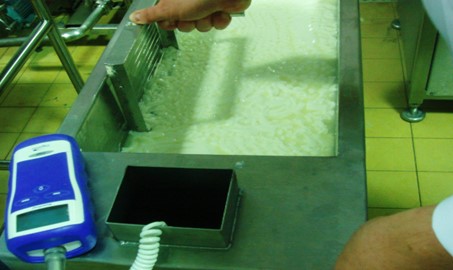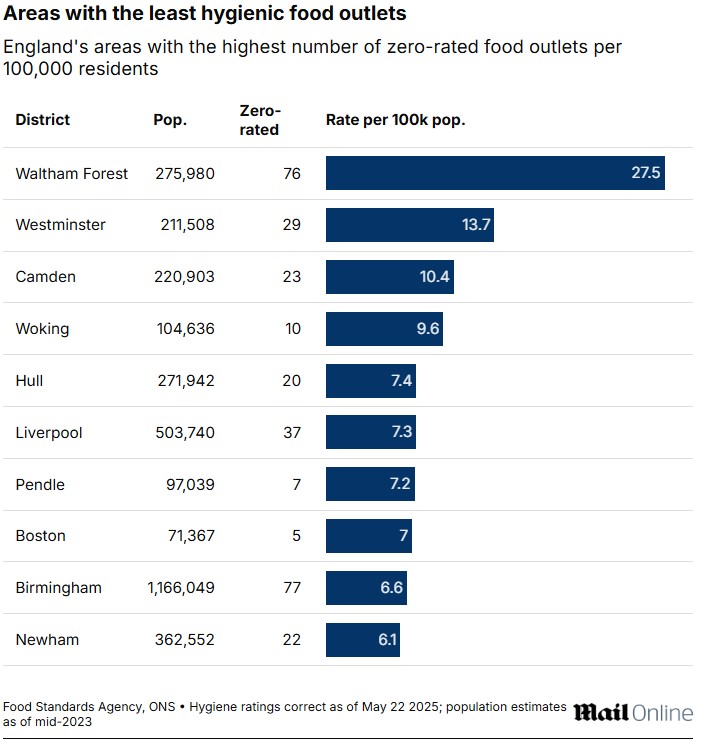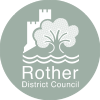For a full pdf copy of this service plan please email una.kane@rother.gov.uk.
- Aims and Objectives
- Background
- Rother Structure
- Food Hygiene in Rother District
- Service Delivery
- Resources
- Quality Assessment
- Agreed and Approved
- Contacts
Aims and Objectives
This Food Service Plan is an expression of Rother District Council’s continuing commitment to Food Hygiene. The mission statement for this service is to
“Deliver an increasingly efficient and effective public health service which strives to promote and sustain a safe, prosperous community for businesses, residents and visitors.”
This plan has been prepared in accordance with paragraph 2.4 of the Food Law Code of Practice (2023).
- The purpose of this plan is to set out how Rother DC will deliver Official Controls within its area.
- This service plan notes paragraph 6 of The Regulators Code (published April 2014), which states that “Regulators should ensure their approach to their regulatory activities is transparent”.
- The food hygiene service of Rother DC is informed by the principles of:
- Proportionately (in applying the law)
- Consistency (of approach)
- Targeting (of enforcement action)
- Transparency (about how we operate and what those regulated may expect)
- The food hygiene service supports the vision of Rother DC Corporate Plan (2020 – 2027) “to put residents at the heart of all we do” by delivering an effective public health service to promote and sustain a safe prosperous community for businesses and residents. Corporate Plan 2020-2027 – Rother District Council
- Rother DC has adopted Equality Policies at Equalities at Rother District Council – Rother District Council. The Environmental Health Service conducts equality monitoring.
- The Better Regulation Delivery Office placed food hygiene at Number 5 in their five priority regulatory outcomes for England (November 2011).
Background
Rother District Council – Profile
Population: 93,100 (ONS UK 2021)
Area: 511.8 Km2
Rother’s District is mainly a rural area with urban centres: Bexhill, Battle and Rye. As a District Council, Rother’s hygiene service is concerned only with food hygiene; the food standards and feeding stuffs function is delivered by East Sussex County Council (Trading Standards).

The District of Rother contains small pockets of rural, coastal and urban living. The food businesses within the District reflects this mix. The coastal areas have a significant holiday industry and seasonal influx of visitors affecting Camber and Rye in particular. Battle is a year-round tourist destination. Bexhill, the main urban development, has a significant care industry which is reflected in the high number of residential care homes. In rural areas there are food approved establishments associated with agricultural and fisheries sectors – one dairy, three cold stores, two egg packers, one meat preparation and two fish products.
Rother District Council Structure
flowchart TB
accTitle: Rother District Council Structure
accDescr: The structure of Rother District Council's members including committees, cabinet and the chief executive
A[Rother District Council \n Thirty-eight Elected Members] --- B[Cabinet]
subgraph Committees
C[Overview and Scrutiny Commitee]
D[Planning Committee]
E[Licencing & General Purposes Committees]
F[Audit and Standards]
G[Human Resources Committee]
H[Joint Waste and Recycling Committee]
end
A --- Committees
A --- I[Lorna Ford \n Chief Executive]
Decisions on this plan and all food hygiene policy matters are delegated to Cllr Field
Councillor details – Councillor Kathryn Field – Rother District Council (moderngov.co.uk)
Cllr Field makes policy decisions on food hygiene and communicates these to Mr R Parker-Harding, the Head of Environmental Health, Licensing and Community Safety.
The senior management structure is under redesign, as proposed below.
%%{init: {'theme':'dark'}}%%
mindmap
root("Chief Executive Officer
(HoPs)")
(Head of Corporate and Strategic Services)
("DCEO
(s151)")
(Head of Housing and Strategic Assets)
(Head of Digital and Customer Services)
(Head of Finacial Services)
(Development Programme Lead)
("Director of Governance and Community Services (MO)")
(Head of Neighbourhood Services)
(Head of Planning)
(Audit Manager)
(Democratic Services Manager)
("Head of Environmental Services and Community Safety (Shared WDC)")
Rother District Council – Environmental Health Structure
flowchart TB
accTitle: Environmental Health Structure
accDescr: The structure of Rother District Council's Environmental Health Department
A[Richard Parker-Harding \n Head of Environmental Services, Licensing & Community Safety] --- B[Catherine Beaumont \n Deputy Head of Service \n Community Protection and Licensing]
A --- C[Una Kane \n Environmental Health Manager \n Food, Safety, Pest & Dog Control and Licensing]
B --- D[Principal Environmental Health Officer \nFour Senior Environmental Health Officers \n Three Licensing Officers \n Seven Pollution Control Officers \n Housing Aid Co Ordinator \n Four Business Support Officers \n Three Occupational Therapists]
C --- E[Nine Senior Environmental Health Officers \n Two Pest Control Officers \n Two Business Support Clerks \n Stray Dog Control Contract]
D --- F[Apprentice Environmental Health Officer]
E --- F
The food hygiene of Rother’s District is carried out by the members of the Food Safety team (FAST), as part of the shared environmental health service and interlinks with UKHSA (United Kingdom Health Security Agency – formerly Public Health England) neighbouring local authorities, Food Standards Agency and other agencies as shown below;
The function of the team, in addition to food hygiene, is to advise on health and safety at work, investigate notifiable infectious diseases, regulate skin piercing, licence holiday and residential caravan sites, licence kennels and catteries, provide pest and dog control service and risk assess private water supplies. We do not use contractors.
The team operates from Town Hall, Bexhill-on-Sea and Vicarage Lane, Hailsham from 8.30am – 5.00pm Monday to Thursday and 4:30pm Friday. The service operates an agile working system. Planned out-of-hour work is undertaken and emergency calls are received by a standby system operated on our behalf by Cornwall Council on 01424 787868.
Any complaints can be submitted to Rother DC website at Environmental Health – Rother District Council or reported by telephone 01424 787500.
Enforcement Policy
Rother DC adopted an Enforcement Policy for the shared Environmental Health service in October 2014, cabinet minute 14/31, is available at
Rother and Wealden District Councils Shared Environmental Health Service Enforcement Policy 2014
The Environmental Health service standards and this service plan can be found at Service standards – Rother District Council
Food Hygiene in Rother District
The profile of food businesses in the Rother district on 1 April 2025:
| Type of Business | Number |
|---|---|
| Caring Premises | 118 |
| Distributor | 13 |
| Hotel/Guest House | 51 |
| Importer | 0 |
| Manufacturer | 29 |
| Mobile | 43 |
| Producer | 30 |
| Pub/Club | 95 |
| Restaurant/Cafe | 232 |
| Caterer | 128 |
| Retailer | 43 |
| School/College | 50 |
| Small Retailer | 137 |
| Supermarket | 12 |
| Takeaway | 43 |
| Total | 1042 |
| Unrated | 2 |
Each year the numbers of food businesses varies as new businesses open and others cease trading. The total of 1042 is higher than last year’s 999.
In 2024/5, sixty-four food businesses ceased trading, thirty-one changed hands and another ninety-four opened their doors for the first time. Unrated food businesses are those that have applied to be registered but are awaiting their first inspection.
Demands on the Food Service
Within the profile of food businesses are ten that are different because they use specialist techniques, produce a very high volume of food or they export food. Cheesemakers, on farm dairies producing milk, yogurt and cream, smokers of fish and meat, egg laying flocks of chickens with packing plants.
These businesses must be approved before they can start to trade and require intensive input from the food service to do so.

There are other businesses which are seasonal, operating only in holiday periods – typically catering in tourist destinations of Camber and Rye, and some which work only in the time before Christmas (turkey slaughter). Many high street businesses operate only in the evenings (takeaways). The food service inspects when the business is operational and does not usually make appointments.
New imported food controls were put in place for Great Britain in April 2024. Rother District Council will have responsibilities for inspecting imported foods, but the detail of what will be required has yet to be announced.
The overwhelming majority of food businesses are cafes, restaurants and shops, public houses, school kitchens, care homes and hospitals. The service does not inspect each of these annually, instead it inspects according to risk and performance to make sure that the highest risk and the lowest performers receive the most attention.
Food Hygiene Intervention Ratings
The Food Standards Agency sets out a numerical scheme which local authorities must use at each food hygiene inspection and this is used to determine;
- When the next intervention will be (date)
- What the next intervention will be (inspection/partial inspection/alternative)
- Food hygiene rating
This numerical assessment of the business is based on the hazards, risks and controls. These figures are entered into the database and the next inspection is planned. The same information is used to create the food hygiene rating to inform customers of the general standards within a food business.
A business that produces high risk food with good controls is seen once between twelve to eighteen months. This intervention frequency will increase to once in six to twelve months if the business serves a vulnerable group (elderly/infirm/young). Any business with poor controls will require the most attention as decided by the inspecting officer. All food hygiene inspections fall into one of these categories;
- Category A and B (92+; 72+)
These are the highest risk food businesses and must be subject to an inspection, partial inspection or audit at least every six months (A) and every 12 months with (B). It is Rother’s policy that these businesses are fully inspected. - Category C (52-71)
These medium risk businesses will receive an inspection, at eighteen months, if they are broadly compliant it will be a partial inspection; otherwise a full inspection will be made. - Category D (31+)
Category D premises are subject to an intervention every 24 months. Where they are rated 30 or 40 for “type of food”, these businesses must be subject to inspection, partial inspection or audit. Where the premises are rated less than 30 for type of food etc. it can alternate between official controls. Rother District Council inspects all category D’s, partial inspections for those that are broadly compliant. - Category E (0-30)
The FSA advice on these lowest risk food businesses is that they could have an intervention every 36 months. It is Rother DC policy that these lowest risk food businesses are subject to a physical inspection or an alternative enforcement questionnaire every 36 months. It is important to retain observation of these lowest risk businesses to prevent minor issues becoming major over a long intervention interval.
Food Hygiene Rating Scheme
The food hygiene rating scheme was adopted by Rother DC in April 2011 to provide information to consumers on the hygiene, structure and management of a food business. At the end of an inspection the business is rated with one of the window stickers below. In England it is not a legal requirement to display FHR stickers, although it is in both Wales and N Ireland. Rother ratings are available at Search the Rother area | Food Standards Agency
Business with a 3, 4 or 5 are deemed to be broadly compliant with food hygiene legislation and those with ratings of 0, 1 or 2 have failed.

In April 2025, 99 % of food businesses in Rother were broadly compliant with food law. Distribution of Food Hygiene Ratings – Rother District Council
Food Hygiene Ratings April 2025 RDC
| Rating | April 2025 | April 2024 |
|---|---|---|
| 0 | 0 | 1 |
| 1 | 2 | 1 |
| 2 | 1 | 3 |
| 3 | 37 | 37 |
| 4 | 102 | 111 |
| 5 | 816 | 761 |
| Broadly Compliant | 99% | 99% |
This terrific result shows that food businesses in Rother have the highest possible compliance rate, which is remarkable especially when compared to the national picture.

Rother had no zero-rated food businesses on 22 May 2025, compared to 76 in Waltham Forest, 29 in Westminster and 23 in Camden.
Food Hygiene Interventions – Performance 2024-2025
A total of 496 food businesses were due for an intervention in 2024-5 plus 5 inspections which had not been done in 2023-4. Of the 496 due inspections, all but one were done, giving a performance of 99.9%. There are no outstanding inspections from the pandemic years.
The annual performance of the Food and Safety Team has restored to pre pandemic standard, as shown below.
The Food Standards Agency checked that all recommendations from their audit of September 2023 were completed and closed the audit in early 2025.
The collated Food Standards Agency report of all audits completed in 2024, is available at Local Authority Audit in England | Food Standards Agency
Service Delivery 2024-2025
Rother DC is committed to providing a full food hygiene service as follows;
For the year 2025-6 the total number of food premises due for inspection is four hundred and fifty-one. These inspections are categorised as follows:
| Category | Number |
|---|---|
| Category A | 0 |
| Category B | 42 |
| Category C | 125 |
| Category D | 170 |
| Category E | 114 |
| TOTAL | 451 |
| Carried forward from 2023 -24 | 1 |
The food hygiene interventions are conducted to ensure the food business meets the requirements of food hygiene law. It is Rother DC’s policy that these planned inspections are given priority and that 98% of this planned programme will be completed.
Our Approach
It is ROTHER DC policy to make food hygiene inspections without appointment. The Environmental Health Officer will identify themselves to the food business owner (or person in charge) before starting the inspection. The intervention will be conducted in accordance with the Food Law Code 2023 in particular:
- The hazards and risks will be assessed
- The controls will be verified
- The businesses validation will be examined
- The findings will be discussed
- A report of visit form will be left
- A follow up letter may be issued
The Environmental Health Officers of Rother DC will also deal with licensing and health and safety issues during a food inspection.
Poorest Performers
In Rother DC food businesses scoring 0-2 will receive more attention and support to continue to raise standards. This means that inspectors will make compliance checks (revisit) within three months of the initial inspection. If significant improvements have not been made Inspectors will take enforcement action.
Those businesses which show little or no improvement may be advised to contact a training contractor for tailored coaching, which they will have to pay for.
Advice and Enforcement
A community centre asked for officer advise when designing their new kitchen and café. An officer spent time with the community group, gave advice and answered their questions. The new café is a modern bright community asset.


In 2024-5 nine enforcement notices were issued to six food businesses. These hygiene improvement notices required the completion of improvement works by a specified date. Usually this involved poor conditions that needed deep cleaning and minor repairs. Sometimes out of date food was found, in fridges and freezers. In other cases, the business management of hygiene and safety was poor with little or no written records. In one business the officer found cooked food out at room temperature – a poor practice that could lead to food poisoning – the officer instructed that the food be disposed of, and a review made of how food was cooled after cooking.



It was clear to the officer that the food business operator did not understand the risks of leaving hot rice, chicken and noodles at room temperature. The business was invited into the town hall, where they spent time with officers learning about food hygiene. When the officer revisited the business, the business had complied with the enforcement notice, foods were cooled rapidly and then placed in refrigeration.
Seasonal Businesses
There are many seasonal food businesses within the Rother district who trade only between June and September or early December. These businesses are inspected according to the Food Standards Agency food hygiene intervention scheme (as 4.2 above). However, those categorised as C are scheduled for an intervention at 18 months which may fall within their closed period. In these cases, it is policy to bring these inspections forward, so they are inspected when they are trading.
Unrated Businesses
A business is unrated when it is registered with the local authority but is awaiting the first inspection. On 31 March 2025 there were two unrated food businesses on the database.
Revisits
Eleven revisits were made in 2024-5. Revisits are made to any businesses where significant statutory requirements were found on the programmed inspection. Revisits are always made after the expiry of statutory notices and to any businesses rated 0-2 FHRS. The number of revisits varies every year, as can be seen below.
Service Requests
Complaints about foodstuffs, food businesses or handlers can be made directly to Rother DC by emailing foodhs@rother.gov.uk or by telephone to 01424 787550.
We do not accept anonymous complaints, full contact details will be asked for, which will be kept confidential. The team will observe the shared service complaint investigation policy, give a first response to a service request within 5 days and complete the investigation within 90 days.
In 2024-5 Rother DC investigated fifty-eight requests for service regarding foods, food hygiene and food safety in food businesses. One member of the public reported the undercooking of burgers, which could cause serious food poisoning. An officer visited the business and served an enforcement notice to ensure all burgers were thoroughly cooked in future.
New Businesses
Ninety-four new food businesses opened in Rother in 2024-5 and another thirty-one changed hands. Each of these businesses was given advice and guidance on both food hygiene and safety matters.
Every new food business is obliged to register with their local authority and this form is available on the Rother DC website along with full advice on starting up a new food business. Starting a food business – Rother District Council
Sampling
Rother DC samples food to ensure it is clean and safe to eat. Food samples are taken and sent to United Kingdom Health Security Agency (UKHSA) in Porton Down for examination.
During 2024 – 5 the food and safety team took samples of cheese, shell eggs and fresh tomatoes as part of national studies to establish the current trends in food contamination. Cheese made from non-pasteurised and pasteurised milk were sampled for E. coli STEC and Listeria. Eggs which were not part of the Lion brand scheme were sampled for Salmonella. Fresh tomatoes were also sampled for Salmonella. All samples were satisfactory.

Primary Authority
Primary Authority allows businesses to be involved in their own regulation. It enables them to form a statutory partnership with one local authority which then provides robust and reliable advice for other local regulators to consider when carrying out inspections or addressing non-compliance. Rother DC does not act as a primary authority for any food business. Rother DC complies with the primary authority principle by checking the appropriate website before conducting food hygiene inspections and noting any assured advice or inspection plans.
Import/Export of Food
Since 1st January 2021 certification of food before export into Europe is required. This means that every consignment of food must be inspected and certified by an Environmental Health Officer before export. In 2023-4 we issued twenty one export health certificates for fresh fish from Rye to the EU.
Notifiable Diseases
In 2024-5 Rother DC received two hundred and forty eight notifications of infectious diseases from UKHSA. Once notified, each case is contacted with advice about their illness to prevent further spread. E. coli 0157, Salmonella and Shigella are the most serious food borne illnesses – we interview these cases and give advice encouraging changes in behaviour to prevent further infections. In very rare cases, we will exclude infected persons from work. There were no outbreaks nor exclusions in 2024-5.
Assistance was given to UKHSA when they requested historic records for contaminated land, where this was suspected to be the cause of disease. This was not proven.
| Reportable Diseases | 2024/5 | 2023/24 | 2022/23 | 2021/22 | 2020/21 |
|---|---|---|---|---|---|
| Campylobacter | 213 | 176 | 176 | 106 | 128 |
| Covid 19 | 0 | 0 | 0 | 44 | 9 |
| Salmonella | 16 | 10 | 18 | 12 | 10 |
| E. coli 0157 | 7 | 17 | 12 | 11 | 10 |
| Hepatitis | 4 | 3 | – | – | – |
| Legionnaires | 0 | 3 | 1 | – | – |
| Para/Typhoid | 0 | 0 | 0 | – | – |
| Listeria | 0 | 1 | – | – | – |
| Shigella | 4 | 4 | 0 | 4 | 0 |
| Giardia | 0 | 3 | 16 | 3 | 1 |
| Cryptosporidium | 4 | 3 | 0 | 0 | 1 |
| Others | 0 | 0 | 0 | 0 | 0 |
| Total | 248 | 220 | 222 | 180 | 159 |
Overall, the total number of notifiable diseases is the highest in recent years. This follows current national trends and is despite how few persons see a GP and obtain a faecal test. New research shows societal burden of foodborne illness in the UK | Food Standards Agency
Food Alerts
In March 2025, the Food Standards Agency instructed all local authorities to contact all care homes, hospitals, and nursing homes within their districts to make sure a frozen dessert was withdrawn from service and held in quarantine for tests. The desserts, with the name “Cool Delights” were found in local care homes and were withdrawn from use immediately.

This food alert was triggered by three deaths, which were linked to a nationwide Listeria outbreak.
No cases of Listeria linked to the nationwide outbreak were identified in Rother.
Advice for Food Businesses
Rother District Council is committed to supporting all food businesses through provision of food hygiene advice on the Rother District Council’s website at Food Hygiene for Businesses – Rother District Council
Business advice is provided at Support and advice – Rother District Council
Resources
| Area | 2025-26 Budget |
|---|---|
| TOTAL cost | £168,886.00 |
| Employee Costs | £157,090.00 |
| Supplies and Services | £11.796.00 |
| Staff | 2.5 FTE |
| Budget Area | £ | Notes |
|---|---|---|
| Sampling Budget | 15,664 | With UKHSA not ROTHER DC |
| Legal Action | 1,000,000 | For general Council disasters and emergencies – not specific to food hygiene functions |
| 9,420 | Specifically, for food hygiene matters |
The number of full-time equivalent staff working on food hygiene, including supervision and management, for 2024-5 is 2.5 FTE. All the authorised food officers are named below. We do not use contractors.
Note EHORB indicates Registration with the Environmental Health Officers Registration Board.
| Environmental Health Officer | Additional Qualification | Level of Authorisation Inspection | Level of Authorisation Enforcement |
|---|---|---|---|
| EDWARDS Simon | EHORB Registration Env Health Degree | A-E | Full |
| HOYLAND Richard | EHORB Registration Env Health Degree | A-E | Full |
| KAMUNDA Maybee | EHORB Registration Env Health Degree | A-E | Full |
| KANE Una | EHORB registration Env Health Degree MSc (Applied Micro) | A-E | Full |
| OGINNI Oladayo | EHORB Registration Env Health Degree | A-E | Full |
| PIPER Richard | EHORB Registration Env Health Degree | A-E | Full |
| POWELL Jamie | EHORB Registration Env Health Degree | A-E | Full |
| SIMMONDS Rachel | EHORB Registration Env Health Degree | A-E | Full |
| WHITCOMBE Ann | EHORB Registration Env Health Degree | A-E | Full |
| WRIGHT Philip | EHORB Registration Env Health Degree | A-E | Full |
Other Officers, within the Environmental Health Department (but not within the Food and Safety team), who are authorised are as follows:
| Surname | First Name | Job Title |
|---|---|---|
| PARKER-HARDING | Richard | Head of Environmental Health |
| RANDOLPH | Mark | Senior Environmental Health Officer |
| BEAUMONT | Cathy | Deputy head of Environmental Health |
The Council employs two Pest Control officers who assist officers in inspecting premises for pest activity and acts as expert witnesses in prosecutions.
Database
The shared Environmental health service uses Idox Cloud as its database, for all inspections and service requests, including food hygiene. There are written procedures how to record inspections to make sure all is accurate and uploads Food Hygiene Ratings correctly to Search for ratings | Food Hygiene Ratings
Staff Development
The shared Environmental Health service between Wealden and Rother has created resilience, improving collective knowledge and experience. Annual appraisals are conducted to identify training needs which form an annual training programme. In December we held a mock food poisoning outbreak with colleagues from across Environmental Health. The “outbreak” began at 9am and team members worked their way through announced “injects”, to bring the outbreak under control by lunchtime.

During 2024-5 team meetings were held every six weeks in person. Full notes of meetings are available on the internet library FAST Team Meetings | RIAMS
Team meetings are used to keep everyone updated on developments within the council and service. Service requests and inspections are peer reviewed. Plans may be made for new work streams. Newly qualified officers are assessed using the FSA competency framework and their authorisation may be tailored accordingly.
Sussex Food Liaison Group Meetings
Rother DC is represented on the Sussex Food Liaison Group by the Environmental Health Manager. This liaison work ensures that our enforcement activities are consistent with those of our neighbours.
In 2024-5 the food and safety team participated in two consistency exercises; these are blind tests designed to ensure that individual officers are consistent with other local authorities. The team score was generally consistent both locally and nationally.
Rother is represented on the CIEH Sussex Branch of the Food Study Group, and UKHSA meetings on infection control.
Quality Assessment
Each year Rother DC’s performance against this plan is measured, using all the specified targets, standards and any targeted outcomes within this plan. The review will specify where there has been variance from the plan and the reason for that variance. Any areas in need of improvement will be specified and an action plan put in place to implement their improvement. For 2025-6 the food programme is up to date. The target is to complete 90% of the planned programme by 31 March 2026.
The service subscribes to RIAMS, Food | RIAMS an on-line Environmental health library service, providing links to national advice and guidance for Environmental Health practitioners. In addition, there is material available on the FSA’s website and their communications hub. There is also a library of law encyclopaedias and reference books in the office.

Agreed and Approved
This Service Plan has been approved by the Head of Service, following consultation with the Cabinet Portfolio Holder.
It is published on the Rother website and in the Member’s Bulletin.
Signed: R Parker-Harding
Mr R Parker-Harding BSc (Hons) MSc DMS CEnvH AMIOA
Chartered Environmental Health Practitioner
Head of Service-Environmental Services, Licensing and Community Safety
Date: 23 June 2025
Signed: K Field
Councillor K Field
Cabinet Portfolio Holder Environmental Health
Date: 23 June 2025
Contacts
Website: www.rother.gov.uk
Address: Town Hall, Bexhill-on-Sea
Telephone: 01424-787550
E-mail: foodhs@rother.gov.uk

